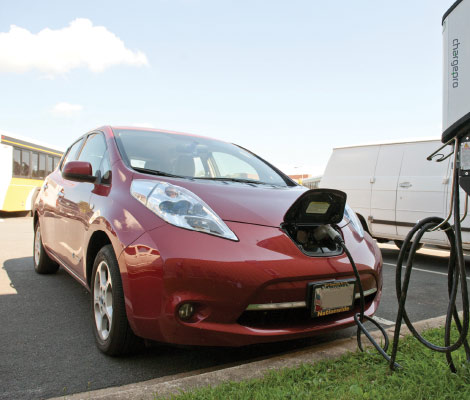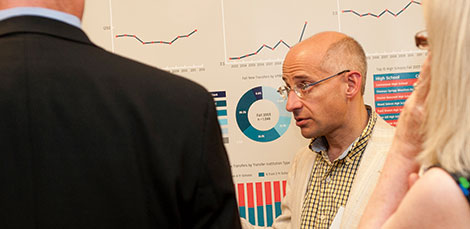Transportation counts for more than one third of UMBC’s carbon footprint, so getting more students, faculty and staff to campus with fewer vehicles is high on the university’s sustainability agenda.
The university has a dedicated system of commuter buses serving surrounding communities (UMBC Transit), but a campus initiative called Transportation Alternatives for a Greener UMBC (TAG UMBC) now offers alternatives to single passenger commuting that make driving to the university a greener experience as well.
TAG UMBC works alongside the Climate Change Taskforce, specifically the Transportation Workgroup chaired by Julianne Simpson, the university’s assistant director for planning .
“The taskforce has different initiatives to reduce pollution and emissions,” says Simpson. “Transportation has been the most active because it’s something that’s tangible.”
One TAG UMBC initiative was to place two electric car-charging stations in the Stadium Parking Lot. The stations, installed in October 2011, were funded by the Baltimore Electric Vehicle Initiative (BEVI) and are free and open to use by the entire UMBC community.
TAG UMBC also sponsors a carpooling program with Parking Services and Off-Campus Student Services. Participants are matched with other individuals who live nearby – and carpool drivers receive a special parking permit that allows them to park closer to campus as an incentive.
The most popular of TAG UMBC’s green alternatives is Zipcar, which has been in place since May 2011. The service allows students—and even faculty and staff—to rent one of two campus Zipcars for personal use. According to Lena Salins ’13, theatre and anthropology, Zipcar is a great resource for residential students without cars on campus.
“I had opted not to get a meal plan senior year since my apartment on campus had a full kitchen, but I had no way to get to the grocery store,” says Salins. “Zipcar was really useful for those short trips I couldn’t have made otherwise.”
Simpson hopes that bringing greater visibility to TAG UMBC initiatives will make the campus community reflect on the impact their vehicles have on the environment – and create support for future green transportation alternatives, such as the bike share program that is currently in the works.
“It’s all about implementing a system of awareness,” says Simpson. “That’s the key to greener transportation at UMBC.”
– Laura Lefavor ’13
Tags: Fall 2013




